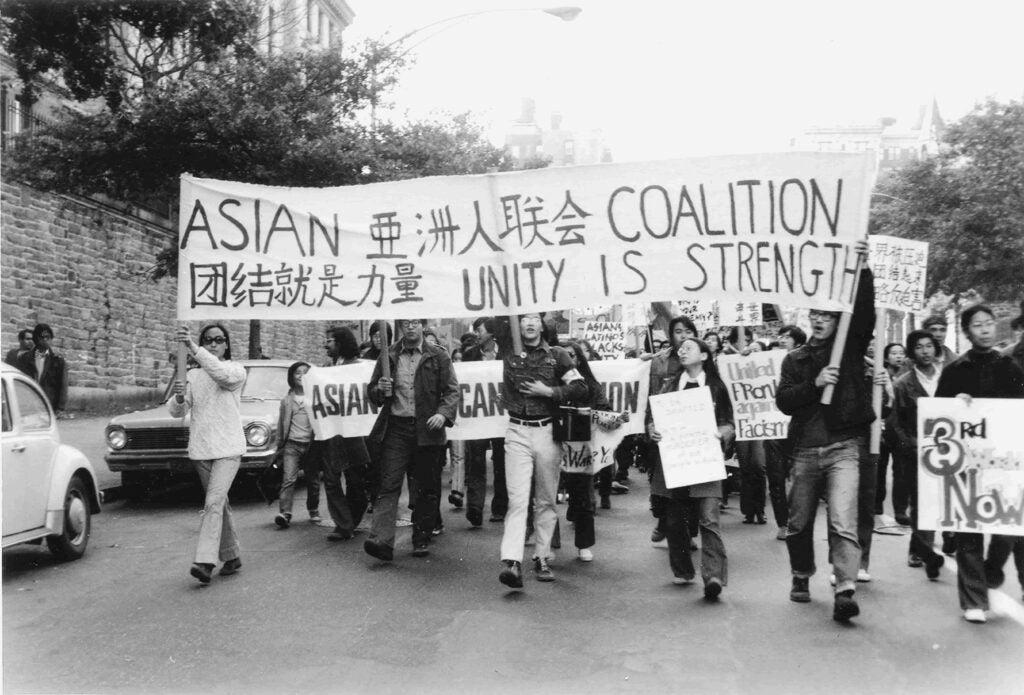
Asian Americans demonstrating in Manhattan against the Vietnam War. Photo by Yuri Kochiyama. Photo Credits
As the Asian American Movement emerged nationwide in the late 1960s, Yuri joined Asian Americans for Action in New York City. She was a featured speaker at Hiroshima Day events, opposing US militarism and imperialism in Vietnam, Okinawa, and elsewhere.
Yuri supported ethnic studies at the City College of New York and the hiring of Chinese constructions workers at Confucius Plaza.
Asian Americans demonstrating in Manhattan against the Vietnam War. Photo by Yuri Kochiyama. Photo Credits
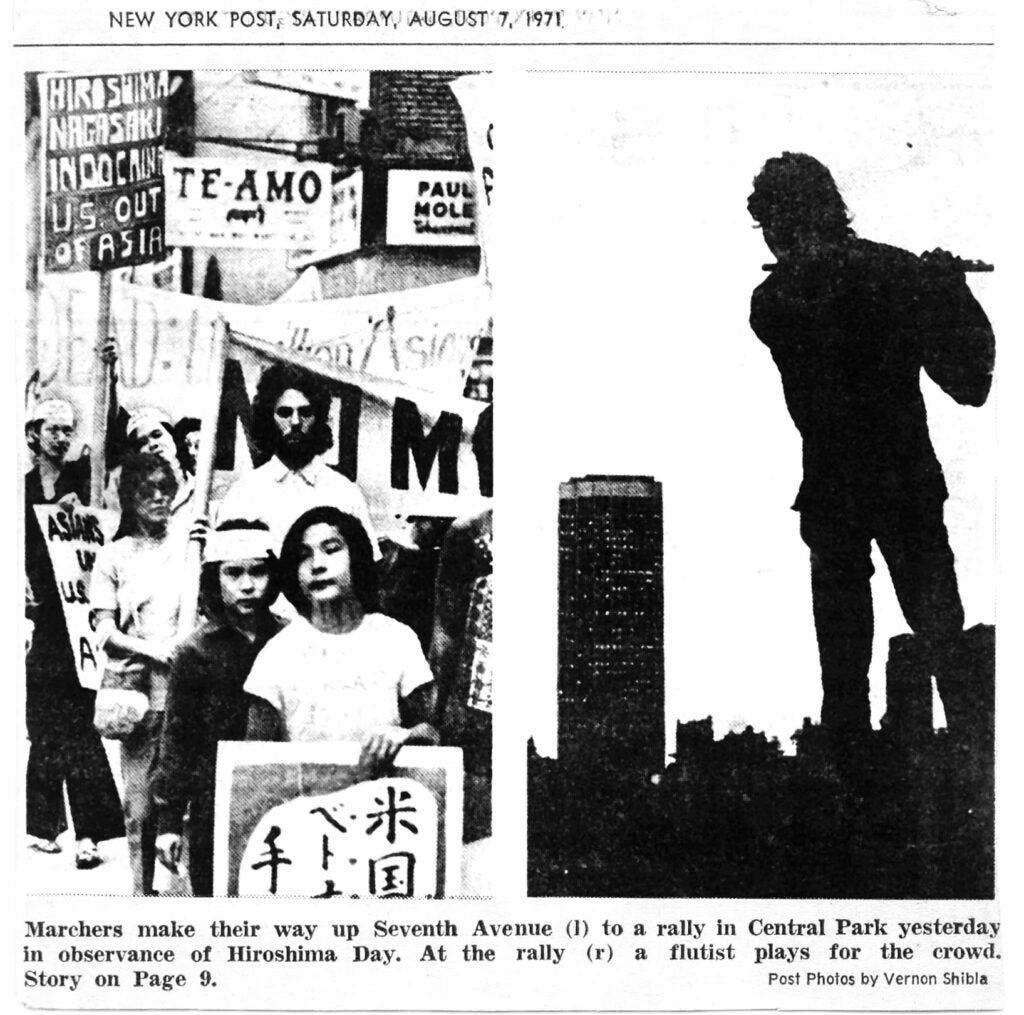
Tommy (with headband) and Jimmy in a demonstration to commemorate the bombings of Hiroshima and Nagasaki at Central Park, August 6, 1971. Photo Credits
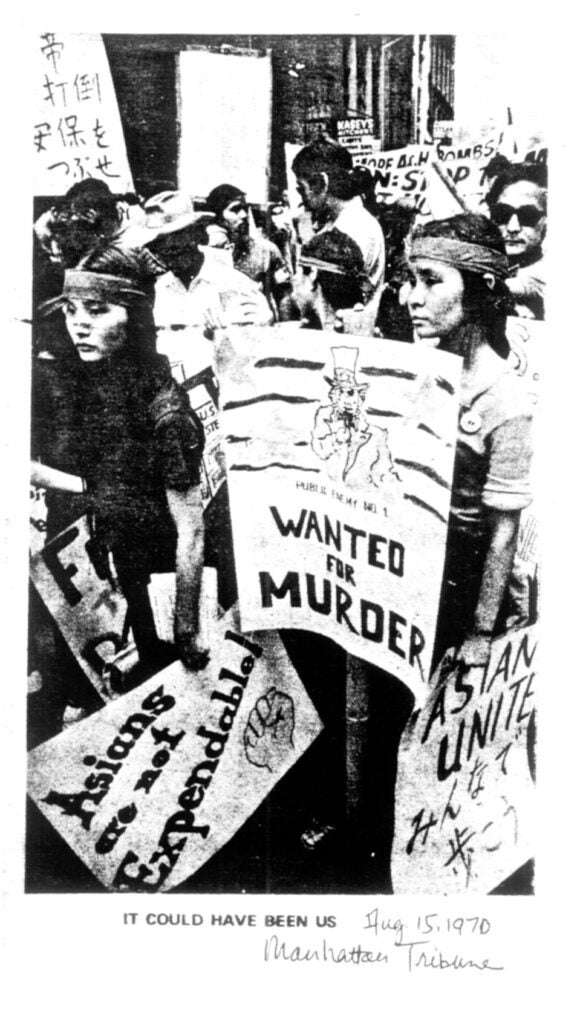
Yuri’s children participated in the movement. Audee (LEFT), Aichi (RIGHT), and Bill (BEHIND AICHI) at a demonstration against the Vietnam War, August 15, 1970. Photo Credits
When the Asian American Movement started in the late 1960s, young activists admired Yuri for her dedication to the Movement and for her connections with Black radicalism. Asian American activists from the West Coast would travel to New York to visit with Yuri and other Japanese American activists with long histories of struggle. Yuri became a foremost bridge between East Coast and West Coast Asian American activists and between the Black and Asian movements.
Not only Yuri, but her husband and children as well, were active in various struggles for justice.
Yuri and Bill got involved in the nationwide movement for Japanese American redress and reparations in the 1970s and 1980s. Bill and Yuri helped to found the East Coast Japanese Americans for Redress (ECJAR). Bill testified at the Congressional hearings of the Commission on Wartime Relocation and Internment of Civilians (CWRIC) in New York City, and Yuri did so in Washington, DC.
Yuri consistently called for Black reparations alongside the demand for Japanese American redress.

Yuri Kochiyama CWRIC hearing. Photo Credits

New York Chapter of the David Wong Committee, 1994. Bill (center); Yuri and Kazu Iijima (seated at right). Photo Credits
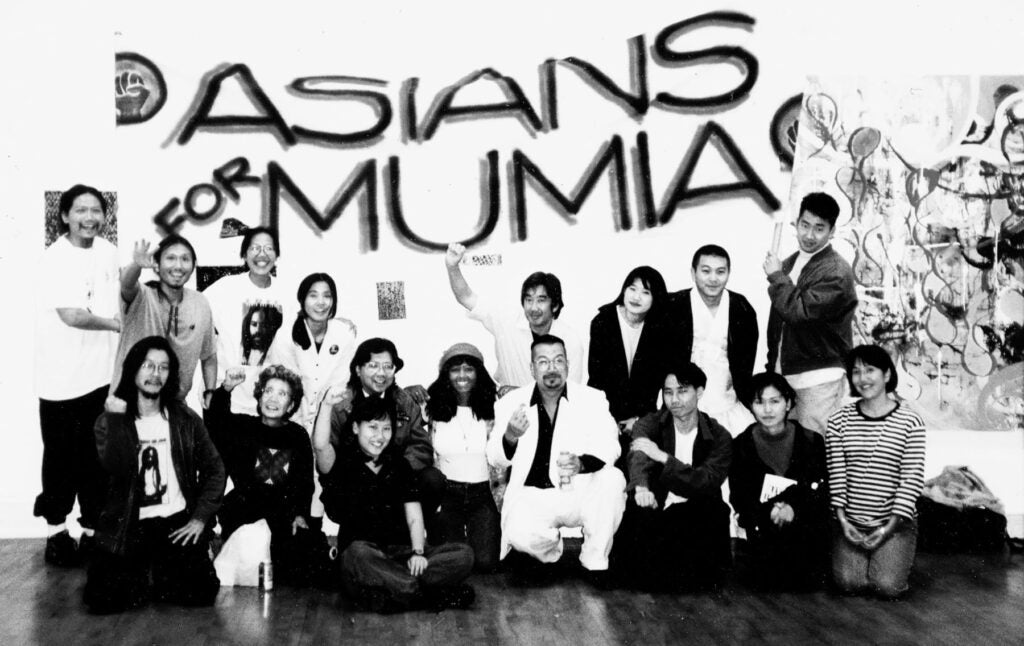
Asians for Mumia, New York City, 1996. Yuri was a strong supporter of Mumia Abu-Jamal, the renowned political prisoner and former Black Panther, since his arrest and imprisonment in the early 1980s. When Mumia was facing the death sentence in 1995, Yuri formed Asians for Mumia and drew Asian Americans into the struggle for political prisoners. Photo Credits
Yuri continued her grassroots activism throughout her life. In the 1990s, she formed prisoner support groups for Asian American prisoners and drew Asian Americans into the struggle for political prisoners.
Yuri inspired the formation of the Asian Prisoner Support Committee. APSC emerged from the campaign to support the San Quentin 3 (Eddy Zheng, Viet Mike Ngo, and Rico Riemedio) who were put in solitary confinement for their work to establish ethnic studies in the San Quentin prison in Northern California.
The APSC, formed in 2002, has organized against Southeast Asian deportation cases, led programs in prisons, and designed culturally relevant reentry programs.
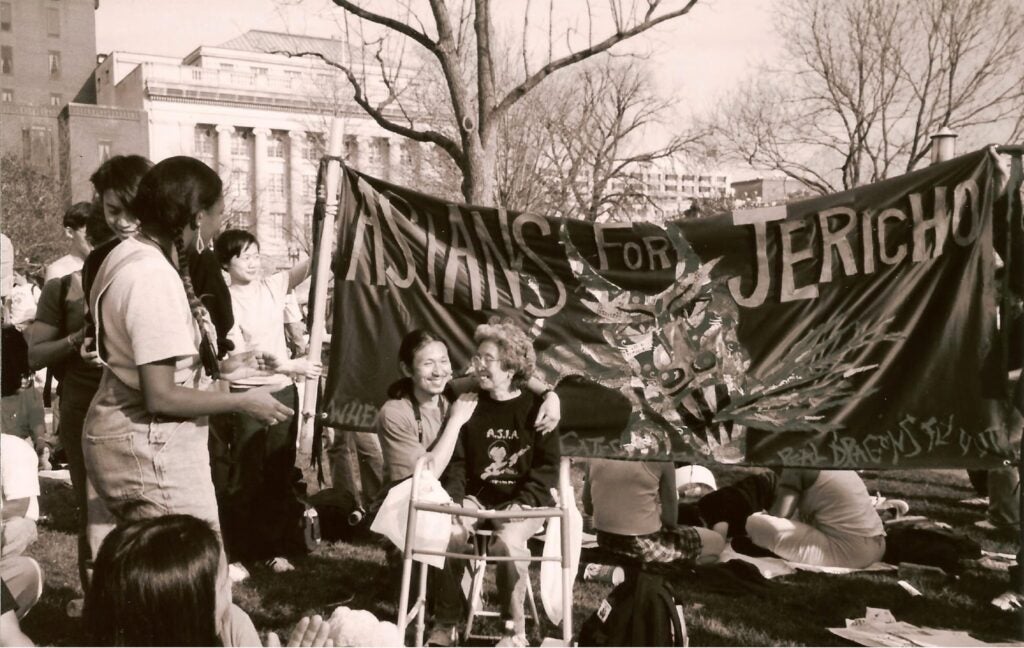
Yuri with Wayne Lum, a leader of the David Wong and Yu Kikumura support committees, in front of the Asian contingent’s banner at the Jericho rally for political prisoners on March 27, 1998, in Washington DC. Photo by Diane Fujino. Photo Credits
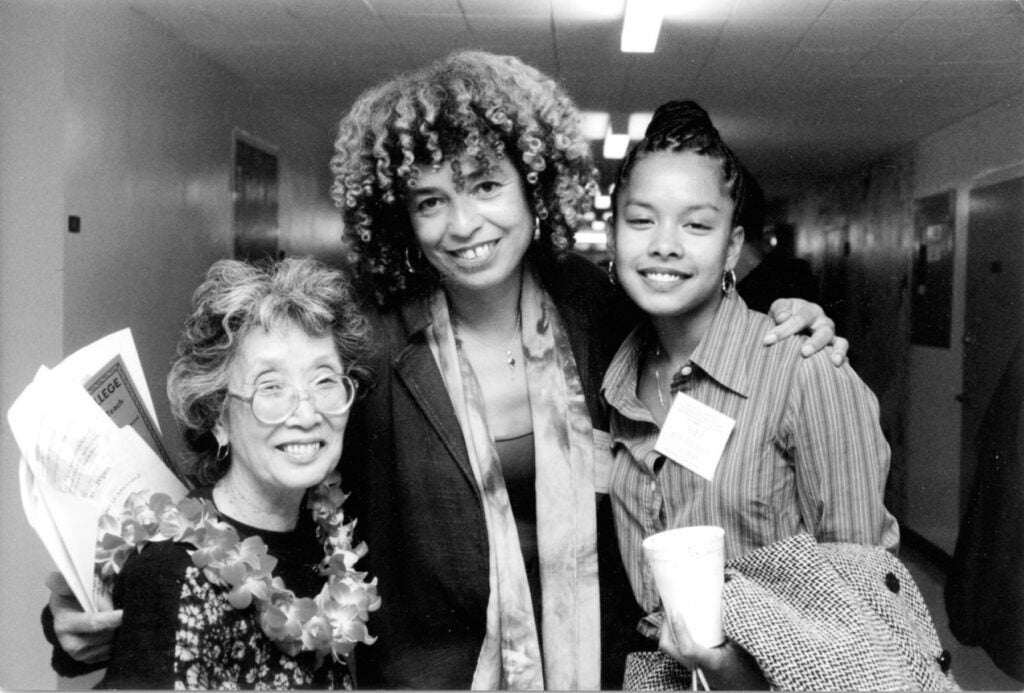
Yuri, Angela Davis and Akemi Kochiyama, October 1997. Angela Davis moderated the African/Asian Round Table at San Francisco State University Photo Credits
In the 1990s, Yuri Kochiyama grew to national prominence as one of the most influential Asian American activists of the 20th century. Asian American college students across the nation began inviting her to be their featured speaker.
In 1999, Yuri moved to Northern California to be closer to family as her health deteriorated. Living in Oakland, the birthplace of the Black Panther Party, enabled her to work closely with activists there and to immerse herself in West Coast activism.
Two documentaries center Yuri’s activism:
* Rea Tajiri and Pat Saunders”s documentary, “Yuri Kochiyama: Passion for Justice” (1993).
* C.A. Griffith and H.L.T. Quan’s “Mountains that Take Wings: Angela Davis & Yuri Kochiyama: A Conversation of Life, Struggle, and Liberation” (2009).
Two books focus on Yuri’s activism and life:
* UCLA Asian American Studies Center published Yuri Kochiyama’s memoir, Passing It On, edited by Marjorie Lee, Akemi Kochiyama-Sardinha, and Audee Kochiyama-Holman (2004).
* Diane Fujino’s political biography, Heartbeat of Struggle: The Revolutionary Life of Yuri Kochiyama (University of Minnesota Press, 2005).
Reflecting Yuri’s growing national stature, UCLA’s Asian American Studies Center invited her to write her memoir, Passing It On, published in 2004. Diane Fujino’s biography, Heartbeat of Struggle, came out the following year. Two documentaries have been made about her: Pat Saunders and Rea Tajiri’s “Passion for Justice” (1993) and C.A. Griffith and H.L.T. Quan’s “Mountains that Take Wings.”
And for one who saved everything and was known as the “internet” of her days, she has extensive archives that are placed at UCLA and Columbia University.
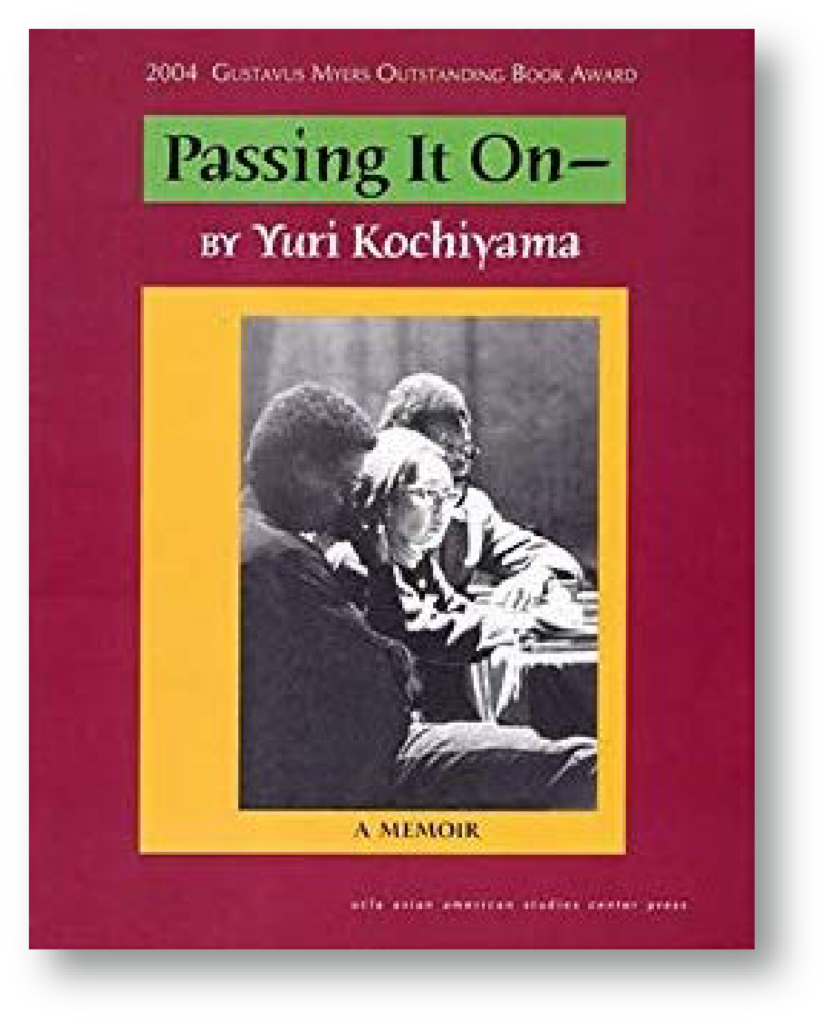
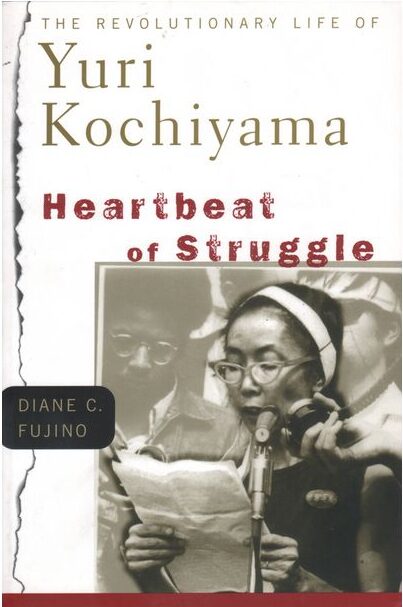

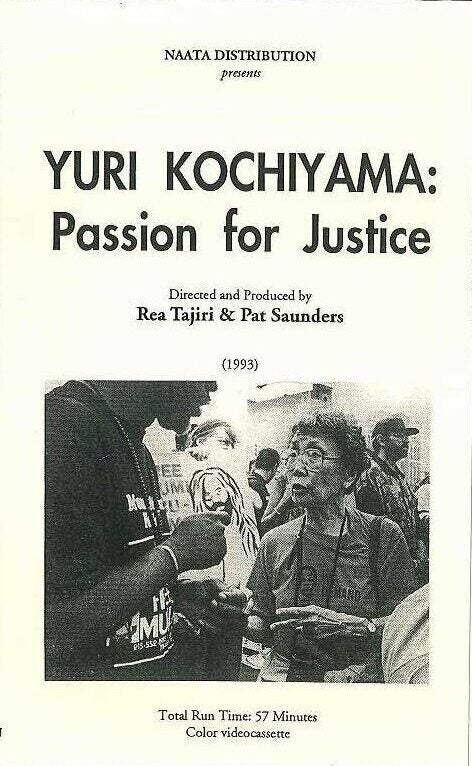
After Yuri passed away on June 1, 2014, her family organized beautiful memorials in Oakland, Los Angeles, and New York.

Artist Shuji Nakamura presents his painting to Audee Kochiyama-Holman, at Yuri’s Los Angeles memorial. Nakamura created the portrait for the “RISE: Love. Revolution. The Black Panther Party” exhibit, Los Angeles, 2014. Photo by Diane Fujino. Photo Credits
One of the most renowned Asian American activists, Yuri has had a notably impact on political activism and popular culture. A small sampling includes:
* The Blues Scholars’s song, “Yuri Kochiyama”
* The Asian American Women Artists Association curated an art exhibition, “Shifting Movements: Art Inspired by the Life & Activism of Yuri Kochiyama,” San Francisco, 2016.
* The Asian Law Caucus established the annual Yuri Kochiyama Impact Award.
* The corporate giant, Google, recognized Kochiyama with a Google Doodle in 2016.

Graphic design by Melanie Elvena. Courtesy of the Asian American Women Artists Association. Photo Credits
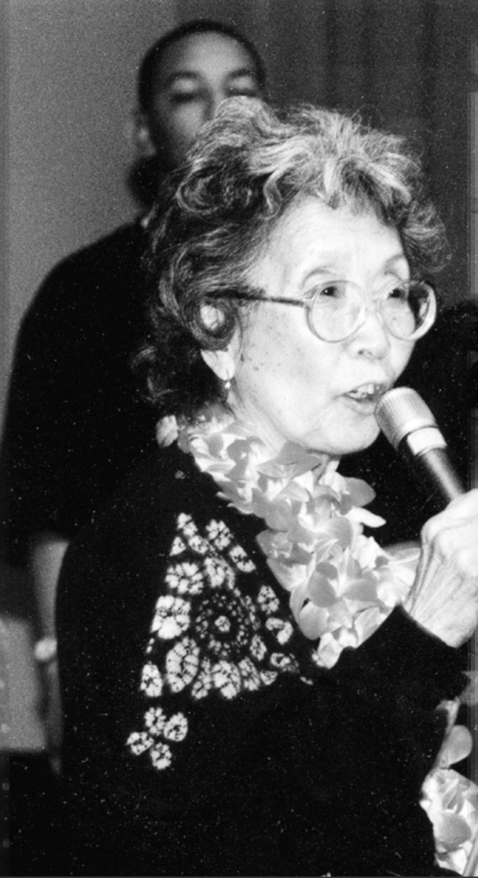
Yuri speaking at the African/Asian Round Table, held at San Francisco State University, 1997. Photo Credits
YURI KOCHIYAMA
Working against the ongoing invisibility of Asian American activism, countless people across the nation are invoking Yuri Kochiyama as a legendary Asian American activist. Her renown only increased for a new generation in the wake of the Movement for Black Lives and new waves of anti-Asian violence during the Covid-19 pandemic.
References
Diane C. Fujino, Heartbeat of Struggle: The Revolutionary Life of Yuri Kochiyama. Minneapolis, MN: University of Minnesota Press, 2005
Diane C. Fujino, “Grassroots Leadership and Afro-Asian Solidarities: Yuri Kochiyama’s Humanizing Radicalism.” In Want to Start a Revolution?: Radical Women in the Black Freedom Struggle., ed. Dayo F. Gore, Jeanne Theoharis, and Komozi Woodard, 294-316. New York: New York University Press, 2009.
C.A. Griffith and H.L.T. Quan. Mountains that Take Wing: Angela Davis and Yuri Kochiyama. Documentary, 2009.
Yuri Kochiyama, Passing It On–A Memoir. Edited by Marjorie Lee, Akemi Kochiyama-Sardinha, and Audee Kochiyama-Holman. Los Angeles: UCLA Asian American Studies Center, 2004.
Yuri Kochiyama, speeches, UCLA Asian American Studies Center.
NPR, Throughline podcast, “Our Own People”.
Rea Tajira and Pat Saunders. Yuri Kochiyama: Passion for Justice. Documentary, 1993.
Hansi Lo Wang (August 19, 2013). “Not Just A ‘Black Thing’: An Asian-American’s Bond With Malcolm X”. NPR, Code Switch podcast.
See Us Unite, “Yuri and Malcolm.” Two icons of American history, Yuri Kochiyama and Malcolm X, share a birthday—May 19—and a passion to change the world.






